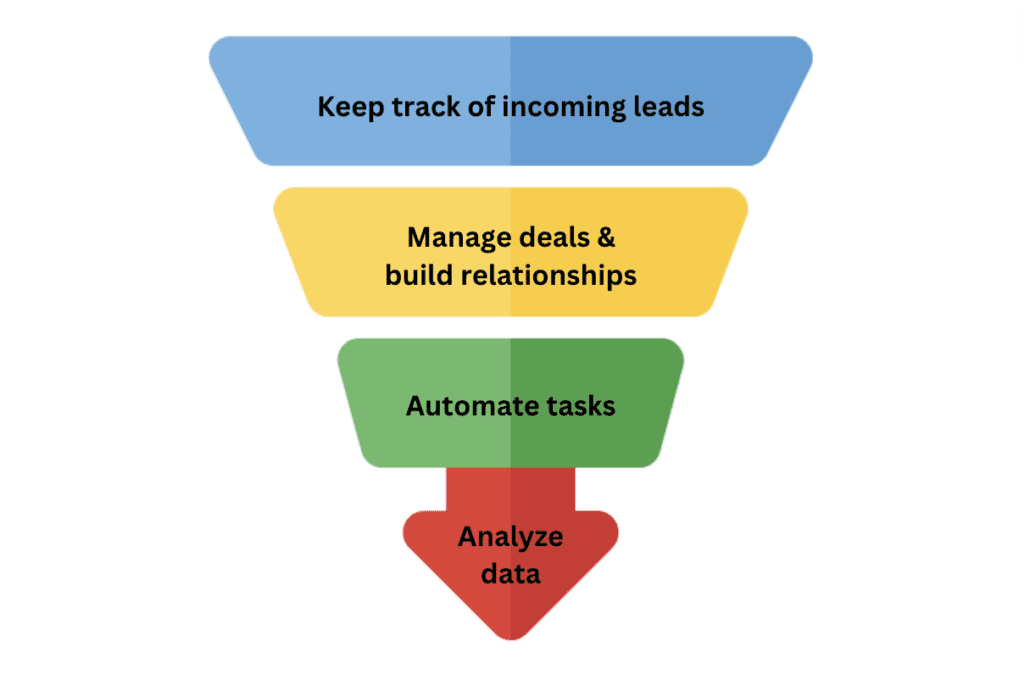Customer relationships are critical for all businesses, but in the real estate industry, where the sums of agreements are high, it is especially important to have a good system to help build strong relationships with people.
A CRM, or Customer Relationship Management system, is your digital toolkit for managing interactions with potential clients. Think of it as a supercharged address book that helps you:
- Keep track of leads: Stay organized and never lose sight of a potential deal.
- Manage deals: Streamline the sales process from initial contact to closing.
- Automate tasks: Spend less time on administrative tasks and more time building relationships.
- Analyze data: Gain insights into your market and tailor your approach to specific clients.

There are many out-of-the-box CRM solutions on the market and they are great. There are online solutions that are great for small businesses (like Monday or Zoho), and there are also more complex solutions for enterprises (like SAP or Oracle).
However, when your business starts to grow and yet hasn’t reached that enterprise level… things are a bit more complex. Medium-sized real estate businesses are the ones that most often struggle with finding a perfect solution for their property management needs.
Challenges of out-of-the-box solutions for medium real estate businesses
There are two primary options to pay for software: pay-per-user and just a general package.
When the company is small, paying a specific fee per user is a great option. You have possibly three or four people who are in charge of the CRM maintenance (or, perhaps, you have just one dedicated CRM administrator) and the cost per month isn’t high.
As your company grows, however, the costs per user mount up and for small companies with limited budgets, this might become an issue.
If you go for the other option – paying for the software package – this might be a good option as well, but you need to make sure you’re paying for what you really need. Another issue with paying per proptech software package is that it might be too expensive right away.
In addition to all the above, there are often hidden costs as well: out-of-the-box CRMs often come with hidden fees, such as user licenses, data storage, and support charges that you have to account for.
In fact, we have a client who realized that a custom-made software solution that is developed specifically for their company’s needs would actually be less expensive than paying per user for the software they were currently using.
If you are a small company, you’re paying for features you’re not going to be using. Much of the functionality in these real estate CRMs may not be necessary for smaller operations, leading to wasted resources.
At the same time, you might enjoy the software and it would do everything you need, except that one small but vital thing that makes your business unique. For example, few software solutions have Franchise Management features – but many real estate companies are franchises.
One more thing in out-of-the-box solutions is customization. In small-level solutions it usually isn’t present at all, in enterprise-level solutions, it often costs an arm and a leg.
Nevertheless, companies are all different and while some processes might work the same way, you often are forced to adapt to the software instead of the software adapting to your company.
Over 15 years ago, I worked at a company where we installed Microsoft Dynamics CRM (Microsoft was our business partner so we didn’t really have a choice of options.) It is a powerful tool, many companies are using it effectively. However, we were a non-profit organization and the main reason for CRM for us was to communicate – track emails, newsletters, etc.
Let me tell you from experience that customizing the invoice-sending feature to send newsletters was a pain in the rear. It included so many unnecessary steps and provided so few insights that it was a nightmare. MailChimp or anything like that would’ve been a whole lot better, but… alas 🤷
- Unique Workflows: Mid-sized companies often have specialized workflows and processes that may not be fully supported by generic CRMs.
- Industry-Specific Features: Real estate-specific features like property management, transaction tracking, and market analysis may be limited or non-existent in out-of-the-box solutions.
- Data Structures: The data structure of a generic CRM might not align perfectly with the way a mid-sized real estate company organizes and manages its information.
Your company grows and the volume of data it generates increases. If your software is based locally, you might face problems with data storage and processing powers. If your software is cloud-based, then the costs might rise for that. However, storage is something that you deal with even with custom-made software products.
What’s more critical in terms of data growth is the processing powers. With more data, performance can degrade, leading to slow load times and decreased user productivity. With custom software you can avoid this problem because you can develop it with scalability in mind, ensuring proper architecture to manage the loads.
Generic real estate CRMs can be great while your company is small and you’re using few tools. As the number of integrations with other systems or data sources increases with the company’s growth, you might face the problem of not being able to integrate with the tools you need (or being limited to the available integrations.)
Another thing is that if you’re introducing a new CRM, then you get issues with integrating with existing systems and legacy data, which can be difficult and time-consuming.
Companies change, adapt, innovate, and grow. The tools they use should be able to accommodate those changes as well. However, with an out-of-the-box solution and relying on a single vendor, you can face limited flexibility and increased costs.
Custom CRMs: A Competitive Edge
Let’s delve deeper into the specific advantages that custom CRMs offer to mid-sized real estate companies:
Tailored to Specific Needs
- Industry-Specific Features: Custom CRMs can be designed to include features that are specifically relevant to the real estate industry, such as franchise management, property management, transaction tracking, and market analysis.
- Workflow Optimization: Custom CRMs can be tailored to match your company’s unique workflows, eliminating inefficiencies and improving productivity.
- Data Structures: A custom CRM can be designed with a data structure that aligns perfectly with your business needs, ensuring accurate data storage and retrieval.
Improved Efficiency
- Automation: Custom CRMs can automate repetitive tasks, such as lead generation, email marketing, and appointment scheduling, freeing up your team to focus on more strategic activities.
- Centralized Information: A custom CRM provides a single source of truth for all customer and property data, reducing the risk of errors and inconsistencies.
- Improved Collaboration: Custom CRMs can facilitate better collaboration among team members by providing a shared platform for communication and task management.
Enhanced Data Insights
- Advanced Analytics: Custom CRMs can be equipped with advanced analytics tools to help you extract meaningful insights from your data.
- Predictive Modeling: Use data-driven insights to predict future trends, identify new opportunities, and optimize your marketing strategies.
- Customer Segmentation: Segment your customer base to tailor your marketing efforts and provide more personalized experiences.
Scalability
- Growth Accommodation: A custom CRM can easily scale to accommodate your company’s growth, ensuring that it remains a valuable asset as your business expands.
- Future-Proofing: Custom CRMs can be designed with scalability in mind, allowing you to easily add new features and functionalities as your needs evolve.
- Integration Capabilities: A well-designed custom CRM can seamlessly integrate with other business systems, such as your accounting software or marketing automation tools.
By investing in a custom CRM, mid-sized real estate companies can gain a significant competitive advantage by improving efficiency, enhancing data insights, and scaling their operations effectively.
Custom PropTech Software for Mid-Sized & Growing Companies
In conclusion, custom CRMs offer a multitude of benefits for mid-sized real estate companies. By tailoring the CRM to your specific needs, you can:
- Be yourself: Run your real estate business as YOU, as the owner or manager, see it. Get the software to adapt to your needs, not the other way around.
- Streamline workflows: Automate repetitive tasks and improve efficiency.
- Gain deeper insights: Analyze customer data to identify growth opportunities.
- Scale your business: Ensure your CRM can grow with your company.
- Differentiate yourself: Stand out from competitors with a powerful and customized CRM solution.
Yes, initially, there would be costs involved. Developing a custom real estate CRM is not going to cost you $12/month. But if you calculate the overall expenses for your current solution when your company grows and compare it to the custom development option, the difference might surprise you. It’s not going to be that much different finance-wise, but you’ll get all the customization you need.
Investing in a custom CRM is a strategic decision that can significantly impact the success of your real estate business. By partnering with a reputable CRM development firm, you can create a solution that aligns with your unique goals and challenges.
Don’t settle for a one-size-fits-all CRM. Take control of your business and unlock its full potential with a customized solution.
Wondering about time-to-value?
Request a no-obligation discovery call and receive a preliminary estimate tailored to your KPIs.


